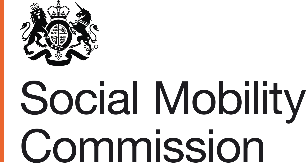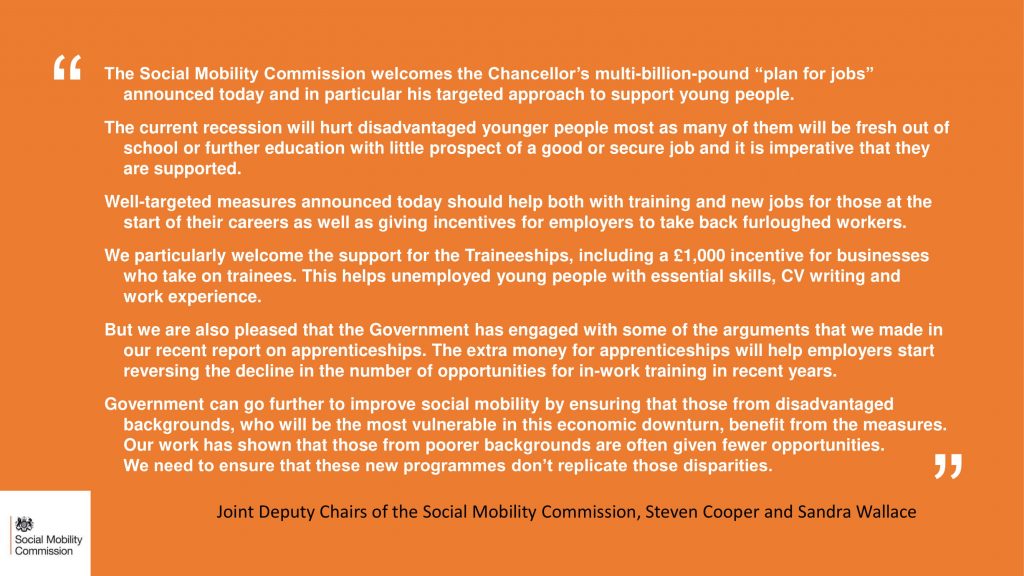Alexandra Sufit leads communications for the Employers’ Programme at the Social Mobility Commission (SMC), engaging with employers on social mobility and wider diversity & inclusion issues. In this blog, she discusses apprenticeships and diversity and how a diverse workforce makes for better business.

Apprenticeships are one of the most powerful and effective means of boosting social mobility amongst workers from less advantaged backgrounds. Not only is it a just cause it’s also a smart business.
Whether you lead a manufacturing company, professional services firm, or a creative platform, attracting and retaining a diverse talent pool is a must for any forward-thinking business. As an employer you can be a change-maker, creating paths of opportunity that will benefit your organisation. One important way in which you can do this is through apprenticeships.
92% of companies who run an apprenticeship scheme believe it leads to a more motivated and satisfied workforce, while 80% report higher retention rates. [1]
When given a decent chance, employees from lower socio-economic backgrounds perform at least as well as their more privileged peers, if not better. Research shows that 43% [2] of businesses with more diverse workforces have higher profits – and apprenticeships are the cornerstone to reaching that talent early.
Individuals who start their careers via an apprenticeship are likely to stay longer, reducing recruitment costs. They also have unparalleled knowledge of your business from working their way up the ladder – and understanding your business at a grassroots level can lead to greater efficiencies.
Crucially, diversity has also been shown to lead to innovation – an ‘innovation mindset’ is six times higher [3] in the most equal work cultures.
So, what are the challenges?
While our research finds that there has been progress in some areas, the picture for learners from less privileged backgrounds is concerning.
Between 2015/16 and 2017/18, the number of apprenticeship starters from disadvantaged backgrounds fell by 36% [4]. The impact was even greater for older (aged 25+) and female apprentices – essentially if you are female, older, and from a less privileged background you are at a triple disadvantage. While the outbreak of COVID-19 has created new challenges for employers and is likely to further reduce opportunities for aspiring apprentices.
However, the research also shows those who do complete an apprenticeship enjoy a bigger boost to their earnings than their better-off counterparts, particularly at the intermediate level – the first step on the apprenticeship journey. To be precise, there is a 16% boost to wages for disadvantaged learners who complete their training (compared to 10% for others).

So, how can you hire in a smarter way, be it apprentices or employees?
We have a host of resources at your disposal, to help you create impactful change as an employer.
Last month we hosted a webinar [5] for employers and published new guidance [6], which highlights the four key questions you should be asking yourself as a business to ensure you are tapping into a diverse pool of talent.
Data drives smart recruitment; so you can also use our Toolkit to measure the socio-economic background of applicants and benchmark your progress going forward [7].
Finally, our in-depth report – Apprenticeships and social mobility: Fulfilling potential – will help you better understand the apprenticeship landscape and barriers to success [4].
At the Social Mobility Commission, we promote meaningful paths of opportunity for those from less privileged backgrounds so that everyone has a decent chance of a better future [8]. We hope that as an employer, you will join us on this journey.

Sources:
[1] National Apprenticeship. 2021. The positive effects apprentices have on business. [online] [Accessed 29/04/21]
[2] Socialmobilityworks.org. 2020. Apprenticeships – why hiring diverse talent is smart business. [online] [Accessed 29/04/21]
[3] Accenture. 2019. Getting to Equal report. [online] [Accessed 29/04/21]
[4] Social Mobility Commission. 2020. Apprenticeships and social mobility: Fulfilling potential. [online] [Accessed 29/04/21]
[5] Social Mobility Commission. 2020. Webinar: develop talent through apprenticeships, drive social mobility. [online] [Accessed 29/04/21]
[6] Social Mobility Commission. 2020. How to get the most from apprenticeships: guidance to employers. [online] [Accessed 29/04/21]
[7] Socialmobilityworks.org. Toolkit. [online] [Accessed 29/04/21]
[8] Socialmobilityworks.org [online] [Accessed 29/04/21]
Register FREE to access 2 more articles
We hope you’ve enjoyed your first article on GE Insights. To access 2 more articles for free, register now to join the Government Events community.
(Use discount code CPWR50)




